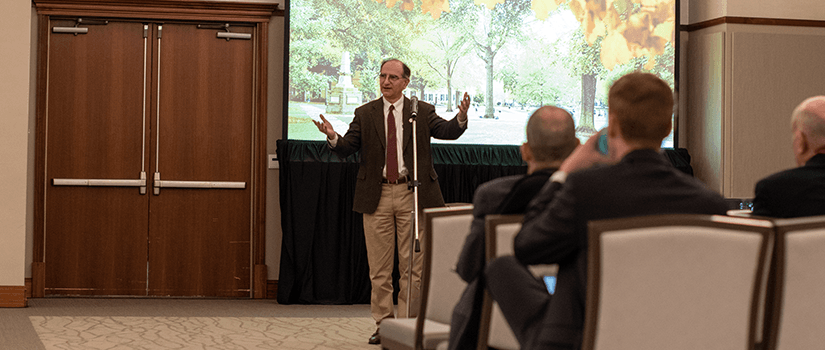By Abe Danaher | March 13, 2020
Worldwide attention has shifted toward creating a cleaner, greener energy future. Long-term goals include zero emissions and an energy grid powered solely by renewable energy sources, such as wind and solar. Opinions differ on the amount of time it will take to achieve this, but one thing is clear – it will be years before a completely green future around the globe is realized. As the transition to renewable energy slowly progresses, experts in the field of combustion engineering are looking to help in the near-term by making traditional fossil fuel combustion methods cleaner and more efficient.
The latest advancements in combustion engineering were shared at the 2020 ESSCI Spring Technical Meeting Eastern States section of The Combustion Institute, which was hosted by the University of South Carolina College of Engineering and Computing from March 8-11. One-hundred leading researchers from universities and national laboratories across the east coast gathered in Columbia, South Carolina, to discuss potential challenges facing the field of combustion and to share potential solutions.
“It may take more than 100 years to be fully green energy,” said Sang Hee Won, an associate professor of mechanical engineering at the UofSC CEC and a local program host. “But what are we going to do in that transition period? Are we going to wait, doing nothing, and continue to pump CO2 into the atmosphere? Or do we need to do something in the near-term? This transition is going to happen, but still, combustion science engineering is very critical to improving our society.”
Attendees heard from esteemed lecturers that included Christopher Shaddix of Sandia National Laboratory, Derek Splitter from Oak Ridge National Laboratory, Hasan Karim from GE Power & Water, and UofSC CEC Professor John Monnier. Conference-goers also toured the UofSC McNair Aerospace Center, which is a leader in various aerospace-related research areas and one of a select few university-affiliated centers in the U.S. capable of conducting industry-scale research.
“This is a nice platform for us to showcase our growing influence in the area of combustion engineering,” said Tanvir Farouk, an associate professor of mechanical engineering at the UofSC CEC and a local host for the conference. “Everyone knows South Carolina for composite materials, Boeing, and whatnot. But they don’t really have an idea of what’s happening in the power and energy sector. It’s a good opportunity to showcase that the University of South Carolina is on the rise.”
The ESSCI Eastern States section meets every two years. It is one of the largest sections of The Combustion Institute, which is a leading educational and scientific society in combustion science and technology.
